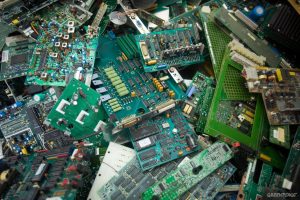India produces an abysmally high amount of e-waste every year and due to the lack of effective implementation of the Extended Producer’s Responsibility (EPR) rules of 2016 introduced by the Ministry of Environment, Forest and Climate Change, a large chunk of such waste is pumped into the informal centres of e-waste recycling, causing health and environmental hazards.

The Ministry of Environment, Forest and Climate Change rolled out the E-waste (Management) Rules in 2016 with the aim of reducing e-waste production and increasing recycling in the most efficient manner.
Under these rules, the government introduced EPR which makes producers liable to collect 30% to 70% (over seven years) of the e-waste they produce, but according to environmentalists, not much is being done on the ground.
India generated about 1.7 million tonnes of electronic waste in 2016, ranking among the top three countries in Asia with the highest e-waste generation in absolute quantities after China and Japan. But, only 1.5% of the total e-waste generated is recycled by formal recyclers or “institutional process” of recycling, according to a study done by Assocham.
The study also suggests that by 2020, India’s e-waste from old mobiles and computers will rise by about 1800% and 500% respectively, compared to levels in 2007.
Swati Singh Sambhyal, Project Director at the Centre for Science and Environment, told an English daily that 98% of the e-waste goes into the informal sector for recycling which causes serious environmental and health hazards.
“The EPR rules need to be strongly implemented to fix responsibility with producers as is done in many developed nations like in the Europe. Even when the government has laid down rules for companies to take back their products after they run out of their life, we do not see any such initiatives from these companies to meet their targets. Presently, they are not even taking back 10% of their products, nor do we see companies making their consumers aware of such a scheme run by electronic manufacturing companies.” Swati Sambhyal added.
Even when some companies have their e-waste recycling boxes at some stores, lack of awareness and incentive among consumers is also a contributing factor to a large chunk of such e-waste landing at the informal sector.
The Central Pollution Control Board (CPCB), India’s apex pollution regulator, issued notices to 225 electrical and electronics manufacturers for failing to meet provisions under the new e-waste management rules. For producers to meet their e-waste recovery targets, they have to obtain authorisation from the CPCB. The notices were issued for failing to even apply for the Extended Producer Responsibility authorisation. Only 143 have received authorisation so far.
By Baishakhi Dutta




























